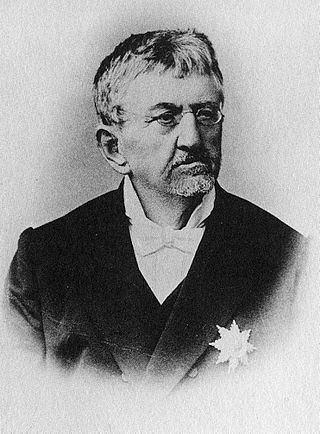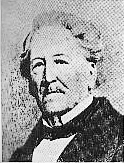Related Research Articles

Paul Eyschen was a Luxembourgish politician, statesman, lawyer, and diplomat. He was the eighth Prime Minister of Luxembourg, serving for twenty-seven years, from 22 September 1888 until his death, on 11 October 1915.
Charles-Mathias Simons was a Luxembourg politician and jurist. He was the third Prime Minister of Luxembourg, serving for seven years, from 1853 until 1860.

Baron Victor de Tornaco was a Luxembourg politician. An Orangist, he was the fourth Prime Minister of Luxembourg, serving for seven years, from 26 September 1860 until 3 December 1867.

Lambert Joseph Emmanuel Servais was a Luxembourg politician. He held numerous offices of national importance, foremost amongst which was in serving as the fifth Prime Minister of Luxembourg, for seven years, from 3 December 1867 until 26 December 1874.
Émile Servais was a Luxembourgian left liberal politician. He was an engineer by profession.
Charles-Gérard Eyschen was a Luxembourgish politician and jurist. An Orangist, Eyschen served in the cabinet of Charles-Mathias Simons as Director-General for Justice.

François Altwies was a Luxembourgian politician. He sat in the Chamber of Deputies, of which he served as President from 1917 until 1925.
Jean-Joseph Norbert Metz was a Luxembourgish politician and engineer. With his two brothers, members of the powerful Metz family, Charles and Auguste, Metz defined political and economic life in Luxembourg in the mid-nineteenth century.
Charles Gérard Emmanuel Metz was a Luxembourgian politician, journalist, and lawyer. He was a prominent pro-Belgian in the Belgian Revolution, serving in the Belgian national legislature, before entering the Chamber of Deputies of Luxembourg, of which he was the first President, from 1848 to 1853.
Théodore Pescatore was a Luxembourgian politician. One of the most important liberals in the mid-19th century, he was president of the Constituent Assembly that wrote Luxembourg's Constitution in 1848. He later held the position of President of the Chamber of Deputies for two years.
Pierre-Ernest Dams was a Luxembourgish politician, judge, and journalist. He was a major figure in the formative years of Luxembourg as an independent country.
Jean Ulveling was a Luxembourgian statesman, politician, and historian. He served as a member of the Council of State of Luxembourg for some years, and was a member of the Constituent Assembly which framed a new constitution in 1848. From 1854 to 1856 he represented the canton of Wiltz in the Chamber of Deputies.

The Fontaine Ministry formed the government of Luxembourg from 1 August 1848 to 2 December 1848. It was headed by Gaspard-Théodore-Ignace de la Fontaine.
The Reuter Ministry was the government in office in Luxembourg from 28 September 1918 until 20 March 1925. It resulted from the Chamber elections of 28 July and 4 August 1918 and was reshuffled on 5 January 1920 as a result of the elections of 26 October 1919. There was a further reshuffle on 15 April 1921, when the Liberals left the government.
The Simons Ministry was in office in Luxembourg from 23 September 1853 to 26 September 1860. Initially it just consisted of three members of the government, to which two more were added on 23 September 1854.

The Willmar Ministry was in office in Luxembourg from 2 December 1848 to 23 September 1853.
The Assembly of Estates was the legislature of Luxembourg from 1841 to 1848, and again from 1856 to 1868.
The Revolution of 1848 in Luxembourg was part of the revolutionary wave which occurred across Europe in 1848. The Grand-Duchy of Luxembourg at that time was in personal union with the Kingdom of the Netherlands.
References
- Mersch, Jules (1972). "Lambert Joseph Emmanuel Servais". In Mersch, Jules (ed.). Biographie nationale du pays de Luxembourg (in French). Luxembourg City: Victor Buck. Retrieved 2008-06-27.
- Thewes, Guy (July 2003). Les gouvernements du Grand-Duché de Luxembourg depuis 1848 (PDF) (in French) (Édition limitée ed.). Luxembourg City: Service Information et Presse. ISBN 2-87999-118-8 . Retrieved 2006-08-02.